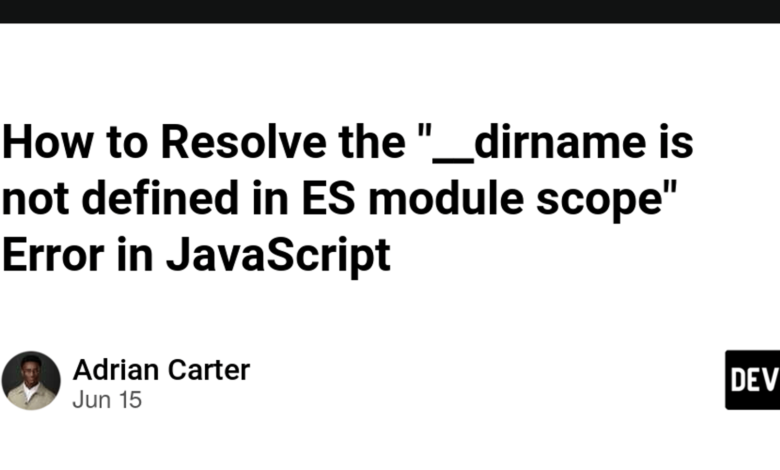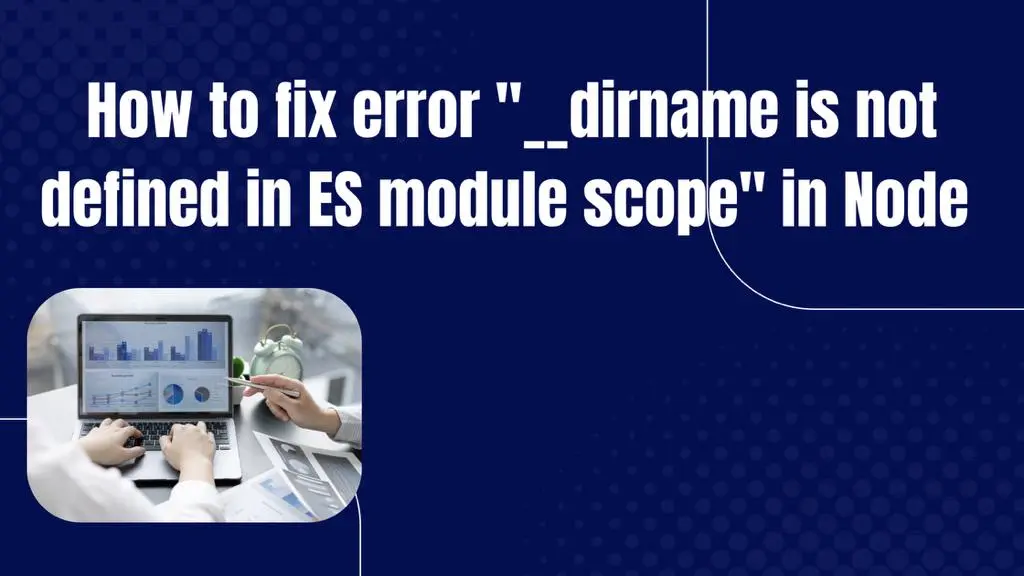ReferenceError: __dirname in ES Module Scope: Fixes

To resolve the “ReferenceError: __dirname is not defined in ES module scope,” switch to CommonJS or use import.meta.url. Encountering this error can be a stumbling block when working with Node.js, especially for those transitioning from CommonJS modules to ES modules.
ES modules, the standard in JavaScript for reusing code across files, introduce some differences from the traditional CommonJS module system, including how directory paths are handled. This can lead to confusion and errors, such as the __dirname not being defined.
Understanding the nature of ES modules and exploring alternatives for directory path access are crucial steps toward effective problem-solving in this context. Armed with the right knowledge and tools, developers can navigate these challenges, ensuring their projects are both efficient and up to date with modern JavaScript practices.

Credit: codebeautify.org
Introduction To __dirname In Es Modules
Introduction to __dirname in ES Modules sheds light on a crucial aspect of Node.js development. The __dirname variable plays a vital role in file path operations. Yet, its behavior changes when working with ES Modules compared to CommonJS modules.
The Shift From Commonjs To Es Modules
The evolution of JavaScript modules brought significant changes. Node.js initially used CommonJS, enabling synchronous loading of modules. It has since embraced ES Modules, a system native to JavaScript for browsers. This shift introduces import and export syntax for modular code.
- CommonJS allows synchronous module loading.
- ES Modules use asynchronous import/export.
- Developers now benefit from a unified module system.
__dirname is not defined in ES Modules
In ES Modules, __dirname is absent. This change stems from ES Modules’ design to be consistent across different environments. Unlike CommonJS, ES Modules do not have variables like __dirname and __filename. Instead, they rely on URL-based paths.
| CommonJS | ES Modules |
|---|---|
__dirname available |
__dirname not defined |
| File-based paths | URL-based paths |
To work with file paths in ES Modules, developers use new patterns. They replace __dirname with alternatives like import.meta.url.
Credit: github.com
Common Errors With __dirname In Es Modules
The shift to ES Modules brought many benefits to JavaScript development. But it also introduced new challenges. One such challenge is handling __dirname in ES Modules. This global variable, common in Node.js, is not available in ES Module scope. Developers often encounter errors due to this change. Let’s explore these errors and understand how to address them.
Typical __dirname Reference Errors
When developers move from CommonJS to ES Modules, __dirname errors are typical. This identifier was once reliable in Node.js for getting the directory name of the current module. In ES Modules, it is undefined. This leads to reference errors during runtime. Developers must find new methods to access directory paths in ES Modules.
Scenarios Leading To Reference Errors
Several scenarios can trigger reference errors with __dirname in ES Modules:
- Direct Use: Accessing __dirname directly in an ES Module will fail.
- Migration: Migrating scripts without replacing __dirname usage.
- Third-Party Modules: Using modules that rely on __dirname.
Understanding these scenarios helps developers anticipate and correct errors. It ensures a smoother transition to ES Modules.
Understanding The Module Scope
Understanding the Module Scope is crucial for developers. It determines how variables and functions are accessed. In Node.js, module systems dictate this scope. Two popular systems are CommonJS and ES Modules (ESM).
Differences In Scope Between Commonjs And Es Modules
CommonJS and ESM differ in handling scope. Let’s explore these differences:
- CommonJS uses
requireandmodule.exports. It wraps code in a function. This creates a local scope. - ES Modules use
importandexport. They don’t wrap code. They use the top-level scope.
__dirname and __filename are not defined in ESM. These are part of CommonJS’s local scope.
How Es Modules Handle Global Variables
ES Modules treat globals differently. Here’s how they handle them:
- ES Modules do not have a global scope like CommonJS.
- Variables are not added to a global object.
- Top-level variables are local to the module.
To mimic __dirname in ESM, use import.meta.url. This is the ESM way to access module-specific information.

Credit: iamwebwiz.medium.com
Alternative Approaches To __dirname In Es Modules
Node.js developers often use __dirname to get the current directory’s path. Yet, with ES Modules, __dirname is not available. This shift requires new methods to find directory paths. Let’s explore these alternatives.
Using Import.meta.url
The import.meta.url property provides the current module file’s URL. It’s a reliable substitute for __dirname in ES Modules. Here’s how to use it:
- Step 1: Access the URL of the current module using
import.meta.url. - Step 2: Convert the URL to a file path with
new URL().
const __dirname = new URL('.', import.meta.url).pathname;
Implementing A Custom __dirname Function
Another method involves creating a custom __dirname function. This function mimics the original __dirname behavior. Follow these steps:
- Define a function that extracts the directory name.
- Use
path.dirname()from the path module. - Combine with
fileURLToPath()for the file path.
import { fileURLToPath } from 'url';
import { dirname } from 'path';
const __dirname = dirname(fileURLToPath(import.meta.url));
These methods ensure you can still work with directory paths in ES Modules. Pick the one that best fits your project needs.
Practical Examples
Today we’re diving into practical examples to fix a common JavaScript issue. If you’re working with ES Modules, you might have encountered a ReferenceError stating that __dirname is not defined. Let’s explore some hands-on solutions to this problem.
Creating A __dirname Equivalent With Import.meta.url
In Node.js, __dirname gives the current module’s directory path. ES Modules don’t have this variable. But we can create something similar. Use import.meta.url to get the current file URL. Then, transform it to a directory path.
import path from 'path';
import { fileURLToPath } from 'url';
const __dirname = path.dirname(fileURLToPath(import.meta.url));
This snippet creates a __dirname equivalent. It works perfectly with ES Modules.
Building File Paths Without __dirname
Sometimes, we need to build file paths without __dirname. Use new URL() for this. The first parameter is the file name. The second is import.meta.url. It’s a neat trick to build paths in ES Modules.
import { fileURLToPath } from 'url';
const filePath = fileURLToPath(new URL('example.txt', import.meta.url));
This code generates a full file path. It does not need __dirname. It’s simple and effective for ES Modules.
Tools And Libraries To Simplify The Transition
Tools and Libraries help developers adapt to new ES Module syntax. They ease the transition, especially when facing the ReferenceError: __dirname is not defined in ES module scope. Let’s explore built-in Node.js modules and third-party libraries that provide support.
Node.js Built-in Modules For Path Manipulation
Node.js offers built-in modules for path operations. These modules compensate for the absence of __dirname in ES modules.
import.meta.url– Retrieves the current module file URL.path– Offers utilities to work with file and directory paths.
Combine import.meta.url with path.dirname() to mimic __dirname.
import path from 'path';
const __dirname = path.dirname(new URL(import.meta.url).pathname);
Third-party Libraries For Es Module Support
Third-party libraries enhance ES Module functionality. They simplify the coding experience for developers.
| Library | Features |
|---|---|
esm |
Enables ES Module features in older Node.js versions. |
babel-plugin-transform-dirname-filename |
Transforms __dirname and __filename for ES Modules. |
Libraries like esm and Babel plugins provide seamless integration of ES Modules.
They help developers avoid common pitfalls like the __dirname error.
Best Practices For Es Module Development
Best Practices for ES Module Development guide developers through the transition from CommonJS to ES Modules (ESM). This shift improves code structure and maintainability. Developers face the ReferenceError: __dirname is not defined in ES module scope issue when migrating. The error occurs because __dirname and __filename are not available in ESM.
Keeping Codebase Compatible With Both Module Types
Compatibility with CommonJS and ESM ensures a smoother transition. Use dynamic import() syntax for this. It allows code to run as both module types. This approach reduces errors during adoption.
- Use conditional exports in package.json.
- Apply dual package hazard solutions to prevent issues.
- Test both module types to ensure functionality.
Avoiding Common Pitfalls In Es Module Adoption
Understanding ESM syntax and behavior is key. Recognize the differences to avoid pitfalls. This knowledge prevents common errors such as the ReferenceError.
| Action | Benefit |
|---|---|
Replace __dirname |
Prevents ReferenceError in ESM. |
| Use URL for directory paths. | Ensures correct path resolution. |
| Import.meta.url for file paths. | Accesses module URL context. |
Adopt ESM-specific features for better results. These practices contribute to a modern, efficient codebase. Embrace the new module system with confidence.
Future Of Es Modules And __dirname
ES Modules and __dirname face a new era.
JavaScript’s module system evolves.
__dirname, once a staple, finds no place in ES Modules.
Developers seek alternatives.
Evolving Standards And Features
The JavaScript ecosystem is dynamic.
ECMAScript modules, or ES Modules, are now standard.
They bring static structure and tree shaking benefits.
Yet, they lack __dirname, a Node.js global.
ES Modules aim for browser and server parity. They use import and export statements. Dynamic imports are also part of this change.
ES Modules support continues to grow. Tools and environments adapt. This includes Node.js and front-end bundlers. The future is clear: ES Modules will be everywhere.
Community-driven Solutions And Their Impacts
The absence of __dirname sparked innovation.
The community responded with workarounds.
These ensure backward compatibility and new patterns.
- import.meta.url emerges as an alternative.
- Tools like path module adapt.
- Custom solutions are created.
These solutions impact development.
They push for more modular and reliable code.
Community efforts shape the future of ES Modules and __dirname.
Frequently Asked Questions
What Is The __dirname Error In Es Modules?
The `__dirname` error in ES modules occurs because `__dirname` is not defined in the ES module scope. This is due to ES modules having a different global scope compared to CommonJS modules.
How Can You Fix __dirname In Es Modules?
To fix `__dirname` in ES modules, you can use `import. meta. url`. You can then process this URL to obtain the directory path, typically with the help of the `path` module from Node. js.
Why Isn’t __dirname Available In Es Modules?
`__dirname` isn’t available in ES modules because ES modules use a different scope and module resolution system. They are designed to be more cross-compatible with browser environments, which do not have a concept of `__dirname`.
Can You Use __dirname In Typescript?
In TypeScript, you can use `__dirname` if you compile to CommonJS modules. However, for ES module targets, you’ll need to use alternatives like `import. meta. url` similar to JavaScript ES modules.
Conclusion
Navigating the intricacies of ES Modules can be challenging, especially with the `__dirname` error. Our exploration has aimed to equip you with the knowledge to resolve this issue efficiently. With the right tools and understanding, you’re now set to enhance your JavaScript projects, ensuring smoother development and deployment.
Remember, embracing modern JavaScript practices is key to staying ahead in the coding landscape. Keep coding, keep learning!




